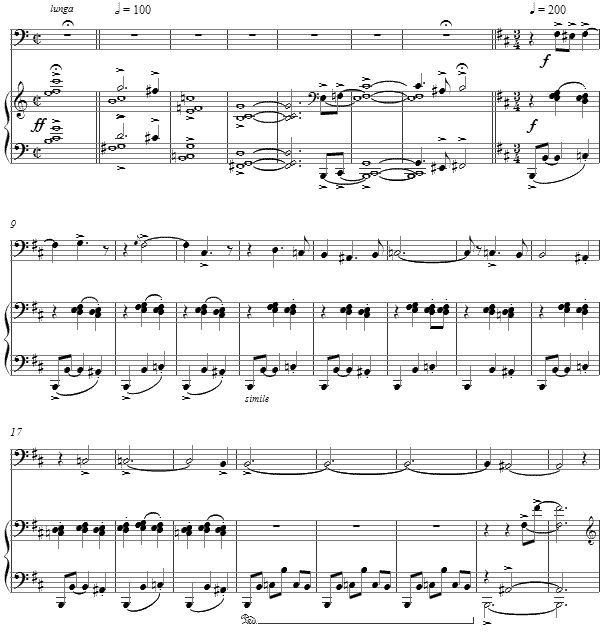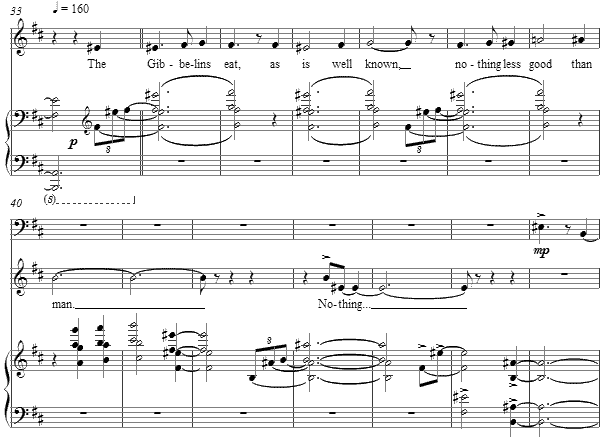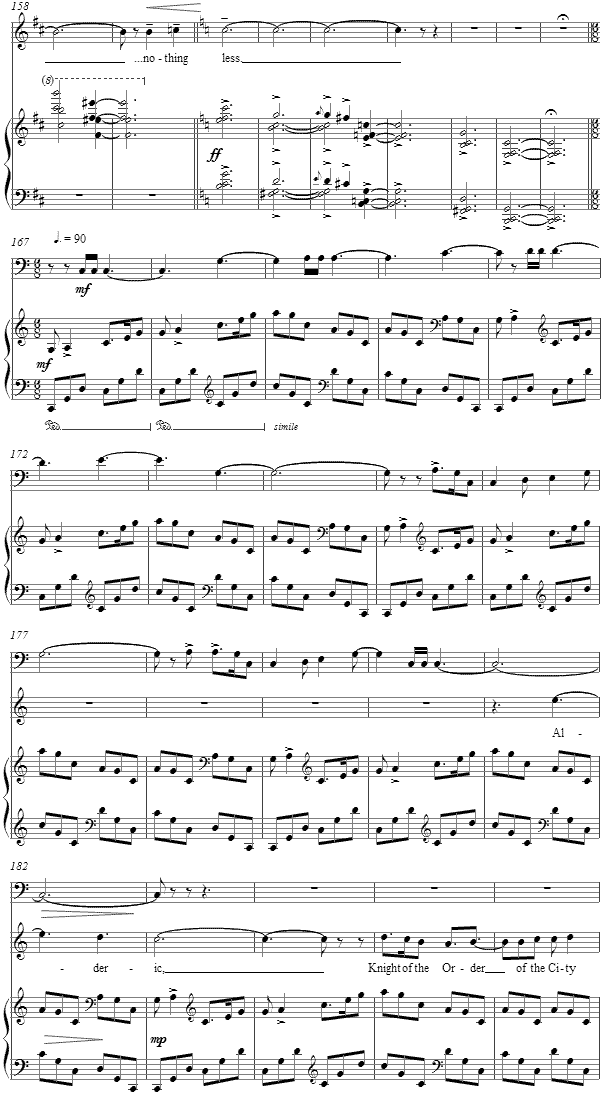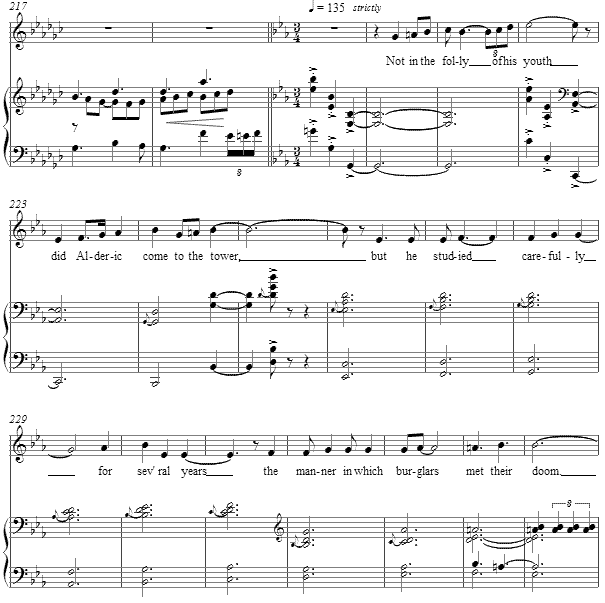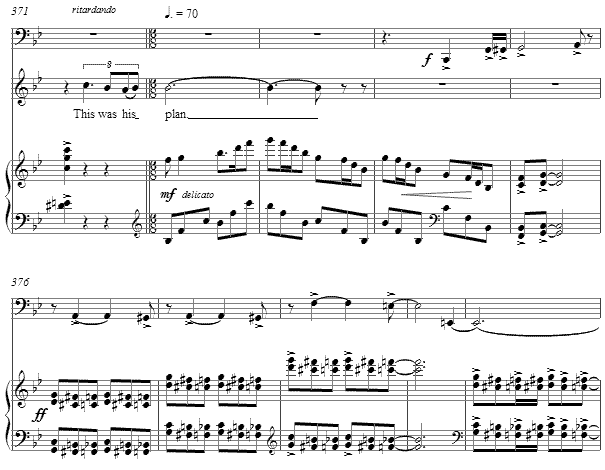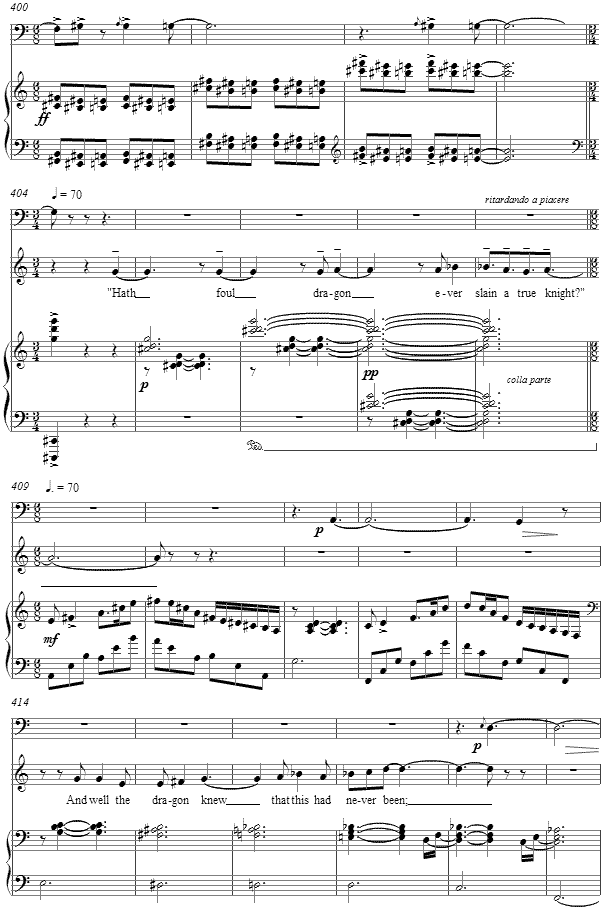Music and Texts of GARY BACHLUND
Vocal Music | Piano | Organ | Chamber Music | Orchestral | Articles and Commentary | Poems and Stories | Miscellany | FAQs
The Hoard of the Gibbelins - (2007)
for horn in F (or Wagner tuba), mezzo soprano and piano
Lord Dunsany
for Lynn and William Melton
The Gibbelins eat, as is well known,
nothing less good than man.
Their evil tower is joined to the lands we know, by a bridge.
Their hoard is beyond all reason,
a cellar for emeralds, a cellar for sapphires.
The use for their wealth is to attract a supply of food.
The Gibbelins eat, as is well known,nothing less good than man.
In times of famine they have ever been known to scatter rubies abroad,
and sure enough their larders would be full again.The Gibbelins eat, as is well known,
nothing less good than man.
Where the river is narrow the tower was built;
they liked to see burglars rowing easily to their steps.
There the Gibbelins lived and discreditably fed.
The Gibbelins eat, as is well known,nothing less good than man.
Alderic, Knight of the Order of the City and the Assault,
hereditary Guardian of the King’s Peace of Mind,
a man not unremembered among the makers of myth,
pondered so long upon the Gibbelins’ hoard
that by now he deemed it his.
Not in the folly of his youth did Alderic come to the tower,
but he studied carefully for several years
the manner in which burglars met their doom.
In every case they had entered by the door.
He consulted those who gave advice on this quest;
he noted every detail and cheerfully paid their fees,
for what were their clients now?
No more than examples of the savoury art,
mere half-forgotten memories of a meal.
These were the requisites for the quest that these men used to advise:
a horse, a boat, mail armour, and at least three men-at-arms.
Some said, “Blow the horn at the tower door;”
others said, “Do not touch it.”
Alderic thus decided: he would take no horse down to the river’s edge,
he would not row in a boat,
he would go alone and by way of the Forest Unpassable.
How to pass, you may say, by the unpassable?
This was his plan.
There was a dragon he knew of who deserved to die,
not alone because of the number of maidens he cruelly slew,
but because he ravaged the very land
and was the bane of the dukedom.
Now Alderic determined to go up against him,
took horse and spear and pricked till he met the dragon,
breathing bitter smoke.
“Hath foul dragon ever slain a true knight?”
And well the dragon knew that this had never been;
he hung his head.
“Then,” said the knight,
“thou shalt be my trusty steed,
and if not, by this spear there shall befall thee
all that the troubadours tell of the dooms of thy breed.”
And the dragon swore to the knight to become his trusty steed;
on a saddle on this dragon’s back
Alderic sailed above the unpassable forest.
But first he pondered that subtle plan
which was more profound than merely to avoid
all that had been done before;
he commanded a blacksmith,
and the blacksmith made him a pickaxe.
There was a rejoicing.
Men hoped that when the Gibbelins were robbed,
they would shatter their bridge,
break the golden chain that bound them to the world.
There was little love for the Gibbelins,
though all men envied their hoard.
The hoard of the Gibbelins.
The Gibbelins eat, as is well known,nothing less good than man.
Alderic mounted his dragon as though he was already a conqueror,
and what pleased the crowd more than the good
was the gold that he scattered as he rode away;
he would not need it, he said,
if he found the Gibbelins’ hoard.
When they heard he had rejected the advice of those that gave it,
some said that the knight was mad,
others said that he was greater than those that gave advice,
but none appreciated the worth of his plan.
He reasoned thus:
for centuries men had been well advised
and had gone by the cleverest way,
while the Gibbelins came to expect them to come by boat
and to look for them at the door
whenever their larder was empty,
even as a man looks for a snipe in the marsh;
if a snipe should sit in the top of a tree,
would men find him there?
Assuredly never!
So Alderic decided to swim the river
and not to go by the door,
but to pick his way into the tower through the stone.
It was in his mind to work below the level of the ocean,
the river that girdles the world,
so that as soon as he made a hole in the wall
the water should pour in, confounding the Gibbelins,
and flooding the cellars;
therein he would dive for emeralds
as a diver dives for pearls.
On the day that he galloped away from his home
scattering largesse of gold,
the dragon snapping at maidens as he went,
they came to the arboreal precipice of the unpassable forest.
The dragon rose at it with a rattle of wings.
Soon even there the twilight faded away;
when they descended at the edge of the world
it was night and the moon was shining.
Ocean, the ancient river, narrow and shallow there,
flowed by and made no murmur.
Whether the Gibbelins banqueted
or whether they watched by the door,
they also made no murmur.
Alderic dismounted and took his armour off,
and saying one prayer to his lady,
swam with his pickaxe.
He did not part from his sword,
for fear that he met with a Gibbelin.
Landed on the other side, he began to work at once,
and all went well with him.
Nothing put out its head from any window,
all lighted so that nothing within could see him in the dark.
The blows of his axe were dulled in the deep walls.
All night he worked, and at dawn
the last rock swerved and tumbled inwards,
and the river poured in after.Then Alderic took a stone, went to the bottom step,
and hurled the stone at the door;
he heard the echoes roll into the tower,
and then he ran back and dived through the hole in the wall.
He was in the emerald-cellar.
There was no light in the lofty vault above him,
but, diving through twenty feet of water,
he felt the floor all rough with emeralds,
and open coffers full of them.
By a faint ray of the moon he saw that the water was green with them,
and, easily filling a satchel, he rose again to the surface; and….
Gibbelins! There were the Gibbelins waist-deep in water,
torches in their hands!
Without saying a word, or even smiling,
they hanged him on the outer wall.
The Gibbelins eat, as is well known,nothing less good than man.
[ 42 pages, circa 24' 00" ]
Lord Dunsany
Lord Dunsany (1878-1957) was an Anglo-Irish novelist, poet and playwright, born in London. His full name was Edward John Moreton Drax Plunkett, 18th Baron Dunsany, born to one of the oldest titles in the Irish peerage. He lived much of his life at perhaps Ireland's longest-inhabited home, Dunsany Castle near Tara, and died in Dublin. Educated at Baton and Sandhurst, he succeeded to the title in 1899, Dunsany served as an officer in the Coldstream Guards during the Second Boer War, in the Royal Inniskilling Fusiliers in World War I and in the local defense forces of both Ireland and the United Kingdom during World War II, and thereafter settled in Ireland at Dunsany Castle in County Meath. In 1940, he was appointed Byron Professor of English in Athens, Greece. Dunsany was a keen huntsman and sportsman, and was at one time the chess and pistol champion of Ireland, as well as provider of the local cricket ground.
His literary works are highly poetic and imaginative. They began in 1905 with the mythological novel The Gods of Pegāna. He paid for the publication of the first such collection, The Gods of Pegāna, earning a commission on sales. This he never again had to do, the vast majority of his extensive writings being commercial successes. At Yeats's invitation he wrote many plays for the Abbey Theatre, including The Glittering Gate (1909) and The Laughter of the Gods (1919). His verse is contained in Fifty Poems (1930) and Mirage Water (1939). He also wrote an autobiographical series: Patches of Sunlight (1938), While the Sirens Slept (1944), The Sirens Wake (1945) and To Awaken Pegasus (1949). Dunsany received an honorary doctorate from Trinity College Dublin.
This strange tale from 1912 is among a number of once very popular short stories with macabre twists. In thinking about setting something for Lynn Melton, mezzo, and her husband Bill, a hornist, I read a number of texts and then settled on this story, redacting it into a scena's libretto. In it, the horn in F (or Wagner tuba, as the range in inclusive of both instruments) plays a number of musical roles -- as a part of the overall accompaniment, as well as the harbinger of the knight and also the dragon.
Vocal range for mezzo soprano
At the opening, a number of themes are introduced -- which recur as the story unfolds -- in the manner of a short overture.
The illustrations below are a "C score," though the score itself contains the proper transposition for horn in F as does the part, of course.
The oft-repeated text, "the Gibbelins eat, as is well known, nothing less good than man," begins the tale, and functions also as the rondo theme in the first section of this extended song, a scena. Of course, as Bill commented, the tale is "bent." Therefore this theme is dark, chromatic and set with dissonances. Common to both the more light-hearted and darker musical themes is the raised fourth of the scale, as can be seen in measure 33 and thereafter.
The opening description ends with a return to the opening statement of the work, a curtain on the Gibbelins closes to now introduce us to the hero (of a "Dunsany "sort) of this tale. The introduction is in a bright C major, the harmonic content consonant and stable, in stark and optimistic contrast to the former, darker musical gestures. The horn announces our heroic knight, Alderic, and his theme is a stable tonic major chord with added seconds and sixths. As the tale progresses, the raised fourth of the scale begins to insinuate itself into these themes, drawing the ear away from a major diatonicism.
As the tale progresses, the rationale for Alderic's quest is clarified in a three-quarter time, notated recitative, marked "strictly" because it is not strictly speaking a free recitative but rather a continuation of the storytelling in a declamando manner.
It becomes the dragon's turn to speak through the growls and bluster of the horn, as well as the parallel fourths which underpin this gruff gesture featuring the lowest register of the horn.
The knight conquers the dragon with words, as it swears unhappily to become Alderic's "trusty steed." The Alderic theme mixes with the dragon's gestures, weakening after being removed from the its hard driving chromaticism. The dragon acquiesces in the setting as in the tale.
There is yet more to the detail in the work, but greater explanation shall be left to some other time. Suffice is to say that the themes play themselves out throughout in the manner of leitmotivs. As Dunsany himself ends the story, "the tale is one of those that have not a happy ending."
Lynn and William Melton
Why this combination of singer and horn? Because of the suggestion by the Meltons for it -- for them. Why this text? In part because Lynn had loaned me an anthology of Lord Dunsany's stories. This particular story leapt out as apt for such a musical storytelling, the first line singing itself to me when I first read it.
Lynn Borok-Melton studied at the University of California at Los Angeles. After two years in the Symphony Chorus of Mexico City, in 1985 she became a member of the Opera Chorus of the Stadttheater Aachen. She coaches regularly with the Symphony Chorus of Aachen, and is a voice teacher as well. Her hobbies include good literature and international cooking. William Melton was born in Philadelphia, 1954, and was a graduate student in music history at UCLA. A horn pupil of the Los Angeles Philharmonic's solo hornist, Sinclair Lott (a protégé of Dennis Brain's uncle, Alfred, and conductor Otto Klemperer), since 1982 he has been a career hornist with the Sinfonfie Orchester Aachen.
For more information on the Wagner tuba and its history written by William Melton as well as more information on the horn and the brass section, please see the site, http://www.wagner-tuba.com.
The score for The Hoard of the Gibbelins is available as a free PDF download, though any major commercial performance or recording of the work is prohibited without prior arrangement with the composer. Click on the graphic below for this piano-vocal score and separate horn part.
The Hoard of the Gibbelins - horn in F

